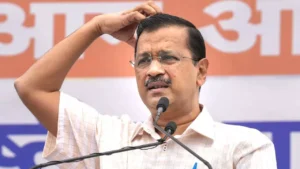On Wednesday, Delhi Chief Minister Arvind Kejriwal took a significant step by appealing to the Supreme Court against a recent high court decision affirming his arrest in connection to a money laundering case related to an alleged excise scam.
Representing Kejriwal, his counsel Vivek Jain informed PTI that they have officially lodged the petition with the apex court contesting the high court’s ruling.This plea is expected to be promptly brought before a bench led by Chief Justice D Y Chandrachud, signaling the urgency of the matter.

The Delhi High Court’s decision, which upheld Kejriwal’s arrest in the money laundering case just a day prior, dealt a severe blow to the Chief Minister, particularly as it occurred right before the Lok Sabha elections. The court justified its decision by emphasizing that the Enforcement Directorate (ED) felt compelled to act after Kejriwal repeatedly ignored summons and declined to cooperate with the investigation.
Furthermore, the high court underscored the ED’s assertion that Kejriwal not only conspired but also actively participated in the utilization and concealment of illicit funds, thus dismissing his plea against the arrest. The court’s rebuke extended to Kejriwal’s political affiliation, as it criticized the Aam Aadmi Party (AAP) leader for questioning the timing of his arrest. The court emphasized that irrespective of one’s position, whether representing the masses or a political entity, justice must be served equally.
Arvind Kejriwal’s legal proceedings
Kejriwal’s encounter with legal proceedings escalated when the ED took him into custody on March 21, mere hours after the high court denied him protection from coercive measures by the anti-money laundering agency. His judicial custody commenced on April 1, following his appearance before the trial court upon the expiration of his ED custody. The battle now shifts to the Supreme Court, where Kejriwal’s legal team seeks to challenge the recent ruling and potentially alter the course of his legal predicament.
As Arvind Kejriwal, the Chief Minister of Delhi, faced a critical juncture in his legal battle, he decided to take the fight to the Supreme Court. His legal representative, Vivek Jain, disclosed that they had formally lodged an appeal with the apex court to contest the recent adverse ruling from the high court.
This development marked a pivotal moment in Kejriwal’s ongoing struggle against allegations of involvement in a money laundering case linked to an alleged excise scam. The decision to appeal underscored Kejriwal’s determination to vigorously contest the charges leveled against him and seek judicial recourse.

The appeal, which is anticipated to receive expedited consideration before a bench headed by Chief Justice D Y Chandrachud, underscores the urgency and significance of the matter at hand. Kejriwal’s legal team is keen to present their arguments and challenge the rationale behind the high court’s decision.
The recent ruling from the Delhi High Court, upholding Kejriwal’s arrest in the money laundering case, had dealt a significant blow to the Chief Minister’s standing and political fortunes. The court’s decision, coming just ahead of the looming Lok Sabha elections, added a layer of complexity and scrutiny to Kejriwal’s legal woes.
The high court’s rationale for upholding Kejriwal’s arrest centered on his repeated refusal to comply with summons and cooperate with the investigation conducted by the Enforcement Directorate (ED). The court emphasized that the ED was left with little choice but to take coercive action, given Kejriwal’s non-compliance and alleged involvement in the misuse and concealment of illicit funds.
In challenging the high court’s decision, Kejriwal’s legal team seeks to contest the allegations and present their case before the highest judicial authority in the country. The appeal aims to address the concerns raised by the high court and potentially secure a favorable outcome for Kejriwal.
At the heart of the legal dispute lies the alleged corruption and money laundering associated with the formulation and implementation of the Delhi government’s excise policy. Kejriwal’s arrest by the ED on March 21 marked a significant escalation in the legal proceedings, further complicating his political and legal predicament.
Now, as the battle shifts to the Supreme Court, Kejriwal and his legal team are prepared to navigate the complexities of the judicial process and pursue justice through legal means. The outcome of this appeal could have far-reaching implications for Kejriwal’s political future and the broader landscape of Indian politics.












Comments 2